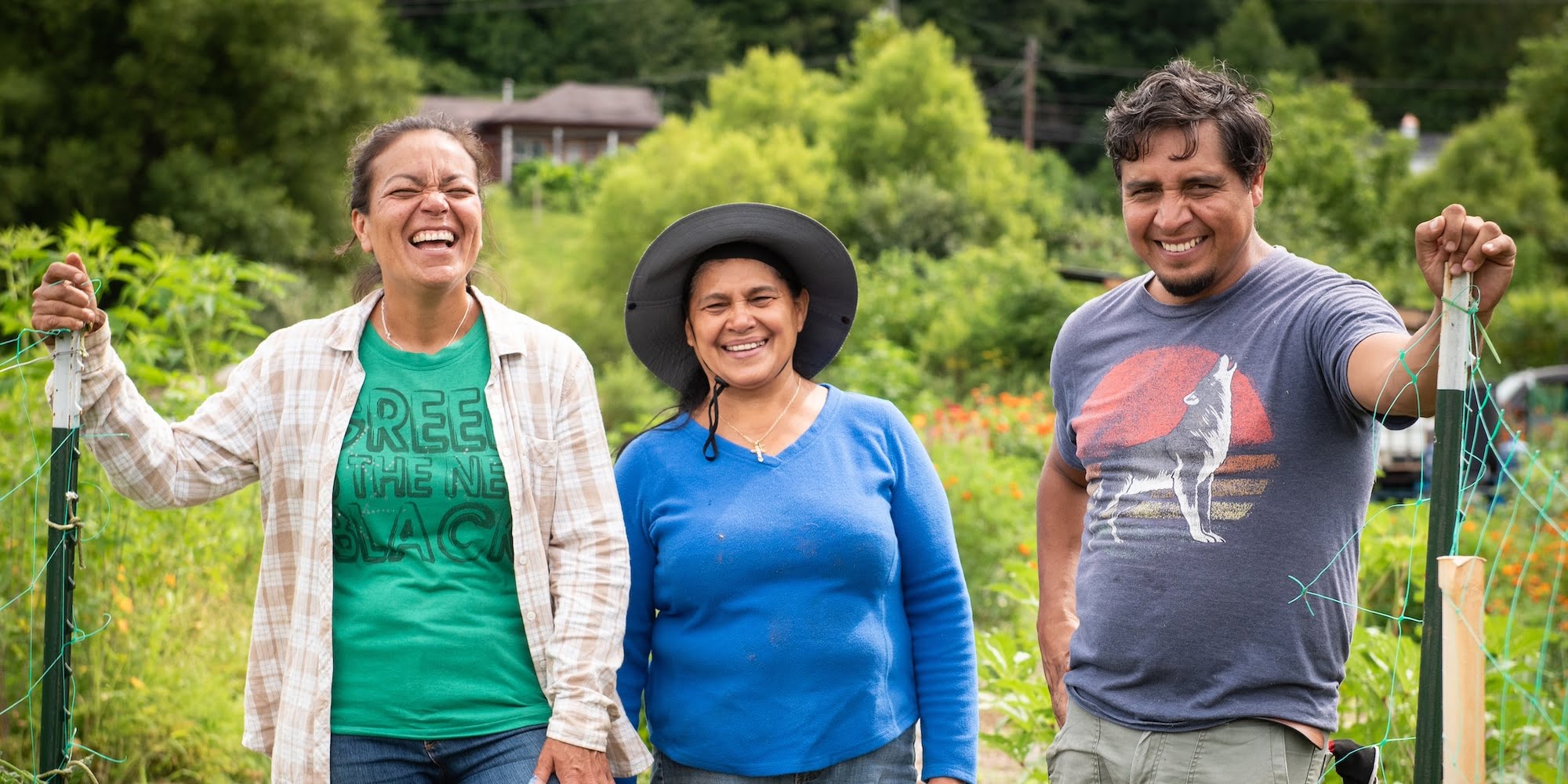“Many Hispanics have a painful relationship with agriculture,” acknowledges Delia Jovel Dubón, co-founder of Tierra Fértil Coop in Henderson County. “A lot of effort has been put into production and profits, with less interest in the protection and care of humans and the environment. We have chosen to farm, but for many Hispanic people, it’s not a choice. We hope to heal that relationship by farming differently.”
Embracing farming as a healthy and even joyful occupation is a guiding force behind Tierra Fértil, which began during the COVID-19 pandemic as a means of embracing community and combating food and economic insecurity. Formed as a Hispanic worker-owned cooperative, the farm produces chemical-free vegetables, fruits, and flowers. Currently Tierra Fértil is made up of three worker-owners, as well as a network of community partners. They sell at several farmers markets in Hendersonville and Asheville, as well as to nonprofit organizations, like Bounty and Soul, which hosts free weekly community markets. Customers can also purchase directly from the farm.
But from its origins, the vision for Tierra Fértil has been more than simply a farm. “We don’t grow food just because we want to sell the food,” says Delia. “We grow food to advocate for our community and recover knowledge. Our ancestors are families that come from the countryside, people who grew food not for selling, but to eat and share with others.”
The idea for the farm initially grew out of Abundancia, a grassroots relief effort that came together in May 2020 to provide fresh, culturally appropriate foods to Henderson’s Hispianic community. That work got Delia thinking more about farming, something she had long been drawn to as a connection to her father and native El Salvador. In that moment, at the onset of the pandemic, it also promised a more secure food supply chain and the potential to generate income for community members who had lost jobs. As a farming collective, they also gained a sense of belonging as an immigrant community.
New Pathways
“I think the reason why we continue visioning Tierra Fértil not just as a farm, but as a community-led initiative, is that we keep seeing opportunities, new pathways to involve our community,” says Delia.
One of those pathways has been Escuela Campesina, a collaborative initiative offering learning sessions open to the community and conducted in Spanish on topics related to food, farming, and health. This past spring’s series included “Identifying toxic products in our home,” “Learning about corn and nixtamal,” “How to grow and care for my plants,” and “Natural remedies.”
“This school is about creating a Hispanic space where people can reconnect with the idea of farming and food production systems as a way to improve our health and wellbeing,” describes Delia. “We understand that we come from an indigenous community that has an ancestral relationship with nature. We have to start recovering the knowledge we have lost because of immigration, etc.”
This past December, Tierra Fértil hosted a Hispanic Christmas market at Grace Lutheran Church. The idea for the market grew out of a training program on starting food businesses. All of the participants were women and part of the Hispanic community. “At the end of the training we decided to make this market,” says Delia. The market featured prepared food from Colombia, El Savador, and Mexico, as well as other local products. “We were so amazed about how the community came to support it.”
While Delia describes that market as a test run, she hopes it can become a more regular event. Southside Community Farm’s BIPOC Farmers Market in Asheville, where Tierra Fértil has been a vendor for the past several seasons, serves as an inspiration. “I have seen that amazing opportunity for small entrepreneurs, farmers, artists,” she says. “It’s creating spaces for this community that we don’t necessarily have.”
Tierra Fértil currently farms on leased land shared with Tiny Bridge Farm in Hendersonville, as well as at a high tunnel plot rented from Calvary Episcopal Church in Fletcher. They initially connected with Tiny Bridge via social media, when Delia posted a query about finding land to start a farm in 2020. Impressed by Abundancia’s food relief efforts, farmers Ed Graves and KP Whaley offered to lease the cooperative an acre of land at a “symbolic” price. Over the past four years, both farms have been able to share experience, labor, and equipment and develop a great friendship. Tiny Bridge’s lease will expire this year and both farms will need to find new land soon.
In September 2023, Tierra Fértil received a grant from the Persimmon Collective Fund, which supports BIPOC farmers and land stewards. “We have been able to create a land acquisition fund,” says Delia. “However we don’t yet have the capacity to purchase land. Land in this area has become unaffordable, and we are thinking of the future. We don’t want to buy one or two acres. We want to have at least 10 acres where we can create a space that is going to become a community farm with vegetables and livestock, education opportunities, affordable housing, and the ability to create other agricultural businesses.”
Delia says that after four years of operation, they are still learning what it means to be a worker-owned cooperative farm. More than a business model, Tierra Fértil is built around the value of working together.
“One of the things that came up [when we were founding Tierra Fértil] is that we immigrants are fertile ground. Our communities are fertile communities. They’re communities that produce a lot, that work a lot, and that are capable of making meaningful changes.”

